How a Coach Can Help You Harness the Power of Metabolic Analysis [Expert Insights from Performance Coach Sean Seale]
For athletes of all levels and backgrounds, performance improvement is a core goal. Metabolic analysis can be the key to uncovering physiological data that opens new doors, unlocks your potential, and supercharges your progress. But why should you conduct metabolic analysis, how does it work, what can it help you achieve, and why is itContinue reading "How a Coach Can Help You Harness the Power of Metabolic Analysis [Expert Insights from Performance Coach Sean Seale]"

For athletes of all levels and backgrounds, performance improvement is a core goal. Metabolic analysis can be the key to uncovering physiological data that opens new doors, unlocks your potential, and supercharges your progress.
But why should you conduct metabolic analysis, how does it work, what can it help you achieve, and why is it so valuable to work with a coach to conduct these tests?
To answer these questions and more, we spoke with Sean Seale at Upside Strength, a performance coach specializing in conditioning and respiratory training for any athlete looking to optimize their practice.
Here’s what he told us.

VO2 Master: In your experience, what types of athletes benefit from metabolic analysis?
Sean Seale: There are multiple cases where metabolic analysis might be of interest to athletes.
The first case is people who are curious about how their body works. There are a lot of upsides to measuring your physiology and getting an idea of how things work internally. This is a great reason to see a coach who can conduct metabolic analysis and then help put all of the pieces together for you, from ventilation to VO2max, thresholds, training zones, and beyond.
This is really insightful both for competitive athletes and those who are less so. You may be an amateur athlete and have an interest in getting to know yourself better. Metabolic analysis helps paint this picture for you.
The second case is people who have performance goals in endurance athletics, whether they’re preparing for a race—a triathlon or a running, cycling, or swimming race.
It’s critical to have baseline information so that you can optimize your training and compare your progress over time.
There’s a saying: “What gets measured gets managed.”
The reality is that, if you don’t measure your performance, you don’t know what’s going on.
When you’re equipped with baseline data, you can better plan your training, optimize everything you’re doing in the lead-up to your event, and then optimize progress between two tests.

As a coach, what factors do you look at when conducting metabolic analysis?
There are a multitude of factors that we can measure:
- VO2: This refers to your body’s consumption of oxygen. This metric allows us to have a good picture of how your body functions. It’s not a performance function, per se, but it is a prerequisite if someone wants to perform better.
- VO2 at different stages of the test: This looks at how your body uses oxygen, not just at max, but also at sub-maximal intensities. This can come into play when we talk about your economy of movement.
- Caloric needs linked to VO2: Especially with longer distances, this can help you dial in your caloric consumption to ensure you’re adequately fueling your body for training and racing.
- Thresholds: Looking at your VO2 at thresholds one and two are really good metrics as well. They allow us to direct training and understand where you might want to focus your efforts.
- Ventilation: This metric refers to how you breathe—how you move air at low, medium, and high intensities. This is interesting both from performance and educational standpoints. Most people don’t have a clue how they’re breathing—it’s automatic. But you can control the way you breathe, slowing down and increasing depth, which can offer a number of benefits, both physiological and perceptual. Lowering respiratory frequency ultimately lowers your rate of perceived exertion (RPE)—how hard it feels to do your exercise.

Why is metabolic analysis important for all calibers of athletes?
In the simplest of terms for both baskets of health and performance, everyone would benefit from the ability to breathe better. Everyone can get something from metabolic analysis, no matter your goals.
As a coach, what would metabolic insights allow you to do for your clients?
As a coach, these metrics give me an overview of your physiology as an athlete and how everything is working.
Ultimately, it allows us to prioritize what you should be working on. It helps us to ensure you’re not wasting time on training sessions that won’t move the needle for you.
In terms of ventilation, these metrics allow me to give you personalized advice on how to optimize breathing at low or high intensity. You can test, train, then re-test down the road and see if you’ve been able to improve that coordination of breathing. We’ll be able to determine if you can take deeper breaths, all while doing movements or exercise at the same levels of output.

What is the benefit of working with a coach for metabolic analysis?
Thanks to tools like VO2 Master, you can conduct metabolic testing virtually anywhere, anytime, and get your results in real-time, delivered to your smartphone.
Where a coach comes into play is in the interpretation of those metrics—helping you to understand what that data means and what to do with it in order to achieve your goals.
Whether you’re a competitive athlete or you’re just looking to improve your overall fitness, working with a coach to conduct metabolic analysis can help you unlock your full potential.
